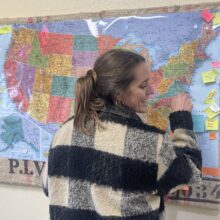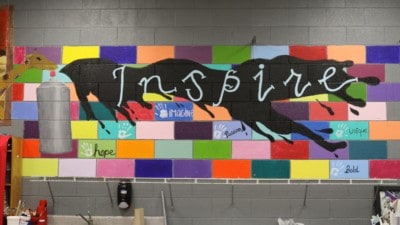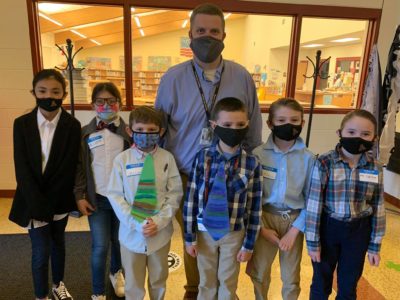Valencia Toomer is a Chatham County native who has worked in education for more than 20 years. In August 2021, she plans to open the School of the Arts for Boys Academy, also known as SABA. Located in Pittsboro, the school will work to close the achievement gap through a culturally responsive and arts-focused education.
Toomer, founder and head of school at SABA, says that teaching through a culturally responsive lens is “an intentional approach woven into every aspect of learning.” SABA will use A+ Schools North Carolina strategies, among others. The charter school began open enrollment in January, and will start with grades 3 through 5, adding on one grade level every year thereafter.


Courtesy of Valencia Toomer 

SABA emblem. Courtesy of Tyrale George of Vizualhype, LLC
She points to the educational disparities in Chatham County, like those reflected in the data found in North Carolina school report cards, as one of the reasons the charter school is needed. The graph below shows that in Chatham County Schools during the 2018-19 school year, 62% of Black students were not proficient in math, compared to only 25% of white students that were not proficient in math.


We spoke with Toomer to learn more about SABA and what she envisions for the charter school. Find the interview, edited for length and clarity, below.
Parker: Could you tell me a little bit more about your background and what led you to education?
Toomer: I know it sounds cliché, but I’ve known since the second grade that I wanted to be a teacher. I started out [my teaching career] in the Charlotte-Mecklenburg school system. I worked in an elementary school, near the university, and then I traveled as a reading consultant for bit.
I went all the way to the pacific northwest, Washington State University, and received my master’s there in K-12 administration. So overall, I’ve been in education now for over 20 years, and 12 years as an administrator.
Education to me has been what I would consider an epidemic, as far as our boys are concerned, and particularly our Black and Brown boys. I grew up in the same town of which we’re starting this school. I recognized at a very young age the disparities that existed. I couldn’t articulate back then that it was a disparity.
Even when I was in the second grade, I was in a school that had duct tape on the doors, and the windows were broken, and we had borrowed books that were in less than fair shape. I vowed even back then, as a young girl, that I would return, and my return at that point was I meant I was returning directly to that school. To make an impact and to ensure that other kids that look like me did not endure what I would say was a second class education.
As I progressed through high school and into college, and into today, I began to do research, and it began to be glaring. I pretty much started charging myself with this, “I am an underdog fighter” mentality.
Parker: Can you tell me about the School of the Arts for the Boys Academy and what you envision it being?
Toomer: SABA has a very unique opportunity to close the [achievement] gap to build boys into men. Using culturally responsive teaching and learning practices, using the arts, using Howard Gardner’s multiple intelligences to find out how the boys learn and how they learn best, and even using AVID.
When we look at those three strategies, Howard Gardner’s multiple intelligences is how they learn, AVID is how they sustain their learning, and the arts is how they apply their learning.
We’re looking for SABA to be able to use all five art forms — visual arts, music, dance, theater, and even media — to be able to teach the boys in all core content areas: in math and language arts, in science, social studies. But also most importantly is that culturally responsive teaching, meaning the boys must see themselves in every aspect of the curriculum.
The other piece about SABA is that cultural exchange regardless of demographics. All students benefit from that cultural exchange and literature. So to be clear, SABA is not isolated to Black and Brown boys, but our focus is making sure that our demographic is culturally and linguistically diverse.
Parker: What do you think are SABA’s biggest challenges and opportunities?
Toomer: One [challenge] would be making the community aware of another educational opportunity. Some families are used to traditional public schools, and you are in it from kindergarten to 12th grade, that’s all you know.
I’m a product of a public school as well. However, right now, my children go to a charter school that is rich in diversity. And so I think that would be a challenge, to assure parents that this is a public school, it is just a public charter school. Getting them [families] to see the need in their boys that would allow them the security and comfort to try this unique approach.
The unique thing about charter schools is that we have an opportunity to be innovative and to be creative. We will still follow the standard course of study within our curriculum, we still take tests, but the way in which we get there does not have to look traditional as it does in the public school.
The biggest opportunity is to build our boys and to change the trajectory of these boys. The biggest opportunity is to have that cultural exchange. The biggest opportunity is that we change the pipeline to prison data, that we truly change the trajectory of these boys.
Parker: If there was one thing you would want people to know about SABA, what would that be?
Toomer: The boys do not have to currently fully love the arts. There are other components of SABA, and that’s why we talk about the culturally responsive teaching, for the boys to be able to see themselves in the curriculum.
I want people to know that just because your son may not be picking up a musical instrument, may not be practicing in front of the mirror with a theatrical piece or singing a song or dance, it does not mean that they cannot or that they would not benefit from SABA.
We are focused on the arts, but we also are focused on academics, on AVID, and even athletics. We’re capitalizing on what we know to be true about boys, to make sure that they are successful while they are at SABA.



